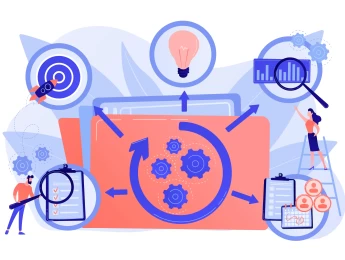Artificial Intelligence is reshaping the future of education by enabling highly personalized, responsive, and scalable learning experiences. AI-powered learning systems analyze learner behavior, adapt to individual needs, and deliver customized content that evolves in real time. This course explores how educators, instructional designers, and EdTech innovators can harness AI to build more inclusive, engaging, and effective learning environments.
Participants will gain a deep understanding of the key technologies, design principles, and ethical considerations behind adaptive learning systems. Through practical examples, tool demos, and applied strategy sessions, this course empowers professionals to design or implement AI-based education solutions that meet diverse learner needs across schools, universities, and corporate training platforms.
By the end of this course, participants will be able to:
- Understand the core components and functions of AI-powered learning systems.
- Explore how adaptive learning technologies personalize learner experiences.
- Identify tools and platforms that support AI-driven instructional design.
- Analyze learner data to inform teaching and content delivery.
- Apply AI to create responsive, goal-oriented learning pathways.
- Address equity, privacy, and ethical concerns in AI-based education.
- Design implementation strategies for AI in academic or corporate settings.
This course is ideal for:
- Educators and curriculum designers seeking to enhance digital learning.
- Learning and Development (L&D) professionals in organizations.
- EdTech entrepreneurs and software developers.
- Academic leaders and education consultants.
- Data analysts working in education or training sectors.
- Instructional designers and online learning specialists.
- Policy-makers and program developers in education innovation.
The course uses a blended learning approach featuring interactive lectures, platform demos, group challenges, and real-world case studies. Participants will experiment with adaptive tools, analyze learning analytics, and design personalized content journeys. Reflective activities and strategy sessions support practical, learner-centered implementation.
Day 5 of each course is reserved for a Q&A session, which may occur off-site. For 10-day courses, this also applies to day 10
Section 1: Introduction to AI in Personalized Learning
- What is personalized learning? Key terms and concepts
- The role of AI in enhancing engagement and outcomes
- From static courses to adaptive, learner-centered pathways
- Overview of AI technologies: NLP, recommender systems, data mining
- Evolution of EdTech and the rise of AI tutors and coaches
- Case studies: AI-driven personalization in K-12, higher ed, and corporate training
Section 2: Key Components of Adaptive Learning Systems
- User profiling and learning behavior analysis
- Real-time feedback loops and performance tracking
- Content recommendation engines and dynamic learning objects
- Smart assessments and AI-driven formative evaluation
- Gamification, microlearning, and personalization algorithms
- Tools overview: Squirrel AI, Knewton, Century Tech, and more
Section 3: Designing Personalized Learning Experiences
- Mapping learner personas and adaptive content flows
- Creating modular and goal-oriented learning paths
- Integrating AI into LMS platforms and mobile apps
- Building intelligent learning dashboards and progress visualizations
- Using AI to support differentiated instruction and pacing
- Activity: Prototyping an AI-enhanced course journey
Section 4: Data, Ethics, and Equity in AI Learning
- Understanding learning analytics and responsible data use
- Privacy, consent, and transparency in AI education tools
- Algorithmic bias and fairness in content delivery
- Addressing digital divides and accessibility challenges
- Human-AI balance: keeping educators in the loop
- Policy and governance considerations for ethical deployment
Section 5: Implementation and Future of AI in Learning
- Building a roadmap for adopting AI in your institution or company
- Staff training and cross-functional collaboration
- Integration with existing systems and legacy content
- Evaluation metrics and continuous improvement strategies
- Future trends: voice-based AI tutors, immersive learning, and autonomous learning agents
- Final workshop: Designing a strategic plan for your AI learning ecosystem
Upon successful completion of this training course, delegates will be awarded a Holistique Training Certificate of Completion. For those who attend and complete the online training course, a Holistique Training e-Certificate will be provided.
Holistique Training Certificates are accredited by the British Accreditation Council (BAC) and The CPD Certification Service (CPD), and are certified under ISO 9001, ISO 21001, and ISO 29993 standards.
CPD credits for this course are granted by our Certificates and will be reflected on the Holistique Training Certificate of Completion. In accordance with the standards of The CPD Certification Service, one CPD credit is awarded per hour of course attendance. A maximum of 50 CPD credits can be claimed for any single course we currently offer.
- Course Code PI2-116
- Course Format Classroom, Online,
- Duration 5 days













